
Berytech brought together experts and entrepreneurs to discuss the pressing subject of Food Security with a particular emphasis on Lebanon and the MENA region, and tackle the 4 pillars of food safety: availability, access, utilization, and stability. Berytech’s aim is to inspire entrepreneurs and change-makers to address the challenges of building a vital safety net for MENA populations, and turning these challenges into business opportunities.
Berytech organized several webinars part of its Meetups powered by GIST events, and the main takeaways from the different discussions during the Food Security in MENA Series are as follows.
Executive Summary
When looking for solutions for any of the food security challenges, organizations as well as entrepreneurs need to keep one thing in mind: localization and understanding the profile of the client or beneficiary they are tailoring solutions for.
The MENA is the only region where food insecurity has increased while being the largest food importer in the world. Technology in the region is largely needed to improve the efficiency and resilience of agriculture systems, value chain traceability, access to market, access to information, etc.
To maintain the food security level needed for Lebanon, we need to make the food and agriculture sectors as smart, as efficient and as productive as possible. The local economic crisis and regional food instability are a motive to shift from a traditional and conventional food culture to a smart agri-tech one. To intervene in improving stability, we must focus on improving stocks or reserves, food processing, and shelf-life, reducing food waste and loss, localizing the food supply chain, as well as making it shorter and closer to the consumer. Technology can play a huge role, because availability is the name of the game. Having a tool that shows you price levels at different shops where the items are available will allow you to observe new trends.
One of the biggest bottlenecks to the development of the agriculture sector is in the antiquated methods of running businesses. The sector is predominantly lacking youth because it is not an attractive sector. The challenge exists in introducing new technology to old mindsets, in bringing forward new trends, that would influence business operations, therefore, enhance their productivity.
There is a need to identify the farmers working in Lebanon, to find a way to communicate with them. There is no data on that, on how much they produce, how much they consume, what are the resources that they need. The lack of data does not mean that we don’t know, it means that there is no verified national data that action can be based upon. Farmers are still skeptical about using technology, so entrepreneurs cannot exclusively rely on introducing technology in agriculture at this stage but look for different innovative means. They should look at not only decentralizing food supply chains, making them shorter and more efficient, but at reducing food waste and losses.
Creating a shift in the access to food requires the creation of more affordable food sources and extending the shelf life of perishable foods to minimize waste. For that to become a reality, agriculture and food sectors need to become smarter by involving technology.
Producers don’t choose to produce unsafe products, but the cost of compliance is often a challenge for small-scale producers, and safe food that is monitored costs more. When safety is not compromised for the sake of the cost, it makes the safe product less accessible for poorer consumers.
Stability of MENA Food Supply Without Interruptions
Civil conflicts, currency devaluations, wars, seasonal changes, and natural disasters decrease food supplies and disrupt the long agriculture and food supply chains of the twenty-first century.
 Berytech Agri-food Expert, Soha Nasser raised the worldwide question of how to feed an ever-growing population by 2050. She highlighted the meaning of food security according to the World Food Summit, Food security exists when people, at all times, have physical and economic access to sufficient safe and nutritious food that meets their dietary needs and food preferences for an active and healthy life. Availability, access, utilization, and stability are the main pillars to achieve food security.
Berytech Agri-food Expert, Soha Nasser raised the worldwide question of how to feed an ever-growing population by 2050. She highlighted the meaning of food security according to the World Food Summit, Food security exists when people, at all times, have physical and economic access to sufficient safe and nutritious food that meets their dietary needs and food preferences for an active and healthy life. Availability, access, utilization, and stability are the main pillars to achieve food security.
Stability is the first pillar struggling today in the MENA region. As per FAO, the MENA is the only region where food insecurity has increased while being the largest food importer in the world. On another hand, Lebanon’s food imports count for 18% of its total imports, wasting 30% of edible food while the count of people in need reaches 2 million. The local economic crisis and regional food instability are a motive to shift from a traditional and conventional food culture to a smart agri-tech one. Soha concluded that we need to fuse between agriculture and technology, make use of the limited agricultural fields, minimize waste, and switch from import to local production.
 Rita Asmar, Co-Founder & CEO of Ground Vertical Farming, introduced the Lebanese agri-tech startup whose objective is to help agribusinesses, mainly greenhouse owners and individuals willing to benefit from the features of vertical farming, optimize the agricultural space, achieve the highest yield at the best quality while reducing their costs.
Rita Asmar, Co-Founder & CEO of Ground Vertical Farming, introduced the Lebanese agri-tech startup whose objective is to help agribusinesses, mainly greenhouse owners and individuals willing to benefit from the features of vertical farming, optimize the agricultural space, achieve the highest yield at the best quality while reducing their costs.
Ground Vertical farming offers a combination of hardware and software. The hardware consists of fully automated vertical panels with an irrigation system embedded with different sensors where plants and greeneries can be planted into a uniquely designed growing medium. All that is controlled by an intelligent controller. The software shows the panels’ activities, and the micro-climate of the greenhouse collects data and sends it to an intelligent dashboard using an IoT system. Ground Vertical Farming will double the planting space, reduce water consumption by 90% and labor cost by 80% and increase export opportunities by helping the Lebanese producers sell their products at competitive prices.
Despite all the challenges this year, the startup worked hard to develop their solution while enrolled in Berytech’s Agrytech Accelerator Program, going through online workshops and training sessions while remaining on the right track thanks to the support of the team.
 Malak Jaafar, Head of Communication & Spokesperson at the UN World Food Program in Lebanon, explained that the food security situation in Lebanon had been flagged by the WFP since before the Beirut Blast with the reliance on imports and the dual currency. Today, Lebanon is dealing with a multiple crisis: the economic crisis and the lockdown measures of COVID-19 which have accelerated the increase of basic food prices by more than 150%. Poverty levels are increasing from 16% last year to 22% this year. This means close to 1 million people in Lebanon are food insecure, leading families adapt to unhealthy coping mechanisms, eating less nutritious food, skipping meals, etc. Food insecurity is not necessarily famine but the reliance on unhealthy sources of food, like canned food, when having limited access to fresh fruits and vegetables, meats, and the likes.
Malak Jaafar, Head of Communication & Spokesperson at the UN World Food Program in Lebanon, explained that the food security situation in Lebanon had been flagged by the WFP since before the Beirut Blast with the reliance on imports and the dual currency. Today, Lebanon is dealing with a multiple crisis: the economic crisis and the lockdown measures of COVID-19 which have accelerated the increase of basic food prices by more than 150%. Poverty levels are increasing from 16% last year to 22% this year. This means close to 1 million people in Lebanon are food insecure, leading families adapt to unhealthy coping mechanisms, eating less nutritious food, skipping meals, etc. Food insecurity is not necessarily famine but the reliance on unhealthy sources of food, like canned food, when having limited access to fresh fruits and vegetables, meats, and the likes.
 Rachel Bahn, Food Security Program Coordinator at the American University of Beirut, agreed that if the lack of access to nutritious food continues over a long period, it will have long-term effects as malnutrition will have repercussions through the entire lifetime of growing children. On the other hand, to focus on food supply, local producers are challenged to export to earn the hard currency much sought after to secure their needs which could be seen as an opportunity.
Rachel Bahn, Food Security Program Coordinator at the American University of Beirut, agreed that if the lack of access to nutritious food continues over a long period, it will have long-term effects as malnutrition will have repercussions through the entire lifetime of growing children. On the other hand, to focus on food supply, local producers are challenged to export to earn the hard currency much sought after to secure their needs which could be seen as an opportunity.
 Souhad Abou Ziki, Economist & Research Consultant at Rural Entrepreneurs, highlighted the reasons for instability in the seasonal variations in stocks, annual variation in production, natural disasters, and conflict. To intervene in improving stability, we must focus on improving stocks or reserves, food processing, and shelf-life, reducing food waste and loss, localizing the food supply chain, making it shorter and closer to the consumer. In short, stabilizing the production. This could direct entrepreneurs to understand where there is an opportunity to intervene. She added that we have to look into more sustainable business models, like community-based agriculture, beyond just looking at technology as just the end but considering it more as a mean.
Souhad Abou Ziki, Economist & Research Consultant at Rural Entrepreneurs, highlighted the reasons for instability in the seasonal variations in stocks, annual variation in production, natural disasters, and conflict. To intervene in improving stability, we must focus on improving stocks or reserves, food processing, and shelf-life, reducing food waste and loss, localizing the food supply chain, making it shorter and closer to the consumer. In short, stabilizing the production. This could direct entrepreneurs to understand where there is an opportunity to intervene. She added that we have to look into more sustainable business models, like community-based agriculture, beyond just looking at technology as just the end but considering it more as a mean.
Souad continued that farmers are still skeptical about using technology, so entrepreneurs cannot exclusively rely on introducing technology in agriculture at this stage but look for different innovative means. They should look at decentralizing food supply chains, making them shorter and more efficient, reducing food waste and losses. When looking at innovation, whether in models or introducing technology, they have to keep in mind the profile of the farmer because the needs and challenges of small farmers differ from large-scale farmers.
Rita Asmar validated the above with the market research conducted by Ground Vertical Farming with results showing that farmers are not open to new technology. The startup pivoted its consumer persona to targeting agricultural businesses and simplifying the interface of the technology to needing no advanced skills for integration.
Souad Abou Ziki believes that we have lessons from the 2008 food crisis which led to a great increase in prices that we can benefit from. We observed coping mechanisms with people skipping meals and shifting to low nutritious foods and studies showed losses in micronutrients in people following such diets especially in the greater Beirut area, but lesser in the Bekaa area. This indicates that having access to land, to fresh produce will make the population less vulnerable to shocks where people in urban areas were more affected. Introducing vertical farming or hydroponics in cities can play a major role in reducing this vulnerability.
Malak Jaafar pointed out that when looking for solutions for any of the food security challenges, organizations, as well as entrepreneurs, need to keep one thing in mind, localization, and understanding the profile of the client or beneficiary they are tailoring solutions for.
Another hurdle Malak pointed at is the lack of clean verified data that organizations can use and base their programs on, a point of struggle that holds back solutions for food security. The traditional on the ground surveys have been made even more difficult by COVID-19. There is a need to identify the farmers working in Lebanon, to find a way to communicate with them. There is no data on that, on how much they produce, how much they consume, what are the resources that they need. The lack of data does not mean that we don’t know, it means that there is no national data that is verified that action can be based upon.
Securing Nutritious Food For MENA
To achieve food security, food ingested must be safe and must be enough to meet the physiological requirements of each individual.
Developing countries struggle to secure food utilization for their population, with the key challenge of securing proper metabolism and proper nutritional intakes for all individuals. The main component is food safety, which affects food utilization, and can be affected by the preparation, processing, and cooking of food in the community and household.
In this session, Soha Nasser, Berytech Agri-food Expert, focused on the utilization pillar in food security confirming that utilization focuses on nutrition but also includes food storage, processing, health, and sanitation.
When talking about the proper use of food, we talk about practices in food preparation to preserve its nutrients. You cannot consider food as nutritious if it is not safe, well processed, and well stored. Another aspect is knowledge of nutrition and childcare techniques, where poor nutrition is responsible for nearly 60% of child deaths in the world (Marketlinks by USAID)[1]. Two billion people in the world did not have regular access to safe, nutritious, and sufficient food in 2019 (FAO)[2]. The COVID-19 pandemic may add between 83 and 132 million people to the total number of undernourished in the world in 2020 (The state of Food security and Nutrition in the world 2020)[3].
Lebanon has faced numerous issues in food safety in recent years. Soha points out that producers don’t choose to produce unsafe products, but the cost of compliance is often a challenge for small-scale producers, and safe food that is monitored costs more. When safety is not compromised for the sake of the cost, it makes the safe product less accessible for poorer consumers.
Due to the economic crisis, household incomes decreased drastically during this year. A FAO study on dietary patterns, according to levels of income, found that diet quality worsened with the increasing severity of food insecurity. Add to it that we may not be able to import a variety of our food needs soon, and we will not have enough arable lands to produce our own food, all of which will affect our nutritious intake. To change this direction, we should look at the economic crisis as an incentive to shift our mindset from conventional agriculture and food processing practices to smart agriculture and food technologies. We need to look more at our food practices from a smart perspective to enforce the fusion between agri-food and technology. In the world of digitization, we need to consider this sector as our pure first opportunity to improve our economy. We need to produce a variety of food that fits our nutritional needs and to smartly control and improve our processing techniques and to share and enhance our nutritious knowledge which we do well, but we have to enforce it. We also need to drastically reduce our food waste. This is where we need this joint effort between agri-food masters and agri-tech minds as one task force.
 Fidele el Achkar, Co-founder of FoodSight, is an entrepreneur bridging the food sector with high technology and advanced innovative solutions. FoodSight has created an online platform that helps small and medium-sized food businesses overcome their food safety challenges by connecting them to freelance professionals from multiple backgrounds and diversified expertise to tackle their most pressing challenges in terms of food safety, quality, and export compliance. The FoodSight team found many gaps in the agri-food sector based on their experience in the F&B industry. They thought of innovative solutions to fill these gaps.
Fidele el Achkar, Co-founder of FoodSight, is an entrepreneur bridging the food sector with high technology and advanced innovative solutions. FoodSight has created an online platform that helps small and medium-sized food businesses overcome their food safety challenges by connecting them to freelance professionals from multiple backgrounds and diversified expertise to tackle their most pressing challenges in terms of food safety, quality, and export compliance. The FoodSight team found many gaps in the agri-food sector based on their experience in the F&B industry. They thought of innovative solutions to fill these gaps.
The startup began phase 1 of the Agrytech Accelerator in October 2019. It was a push for them to build solutions to answer current problems. All the challenges that the startup faced in the past year did not affect their level of commitment, because they believe that their solution will disrupt the way food safety is tackled in the region, create business opportunities, and have a strong social impact.
The hard work of the two women founders paid off this summer by being selected in the top competing startups in the Step annual conference and as finalists in the Future Agro Challenge competition and Seedstars. After one year of working on their idea, supported by the Berytech team and mentors, FoodSight launched its online platform with 200 registered users and 5 customers on board. The platform will provide customers with affordable consultancy packages as well as access to an online library of regulatory documents through a B2B premium model. Food businesses will be able to enhance the quality of their food products, improve business standards, and increase revenues.
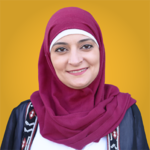 Ghiwa al Hallak, retail associate at the UN World Food Program in Lebanon, explained that the objective of the recently launched retail unit in the organization is to increase the purchasing power of beneficiaries, to leverage the power of data collected, to improve competition, and to have a perfect coverage depending on the beneficiaries’ residence area. The strategy of the retail unit is focused on strengthening the capacity of these retailers. WFP has always thought of these retailers as their partners and wanted to give them the advantage of retail expertise that WFP brought in from international markets. Training materials were developed including aspects of starting from the basics of having retail shops, quality, hygiene, food safety, and all the best practices in the industry.
Ghiwa al Hallak, retail associate at the UN World Food Program in Lebanon, explained that the objective of the recently launched retail unit in the organization is to increase the purchasing power of beneficiaries, to leverage the power of data collected, to improve competition, and to have a perfect coverage depending on the beneficiaries’ residence area. The strategy of the retail unit is focused on strengthening the capacity of these retailers. WFP has always thought of these retailers as their partners and wanted to give them the advantage of retail expertise that WFP brought in from international markets. Training materials were developed including aspects of starting from the basics of having retail shops, quality, hygiene, food safety, and all the best practices in the industry.
 Makram Bou Nassar, lecturer on entrepreneurship in Agriculture at AUB’s Faculty of Agriculture and Food Sciences, believes that there are numerous opportunities for students in agribusiness who work on projects related to the food industry. They are coming up with numerous ideas which they succeeded in turning into businesses. Makram believes that the main issue that any entrepreneur should focus on is creativity, looking well into the market needs and how they can use available research and technologies to come up with new ideas that serve the customers in the market. Food safety is one of them.
Makram Bou Nassar, lecturer on entrepreneurship in Agriculture at AUB’s Faculty of Agriculture and Food Sciences, believes that there are numerous opportunities for students in agribusiness who work on projects related to the food industry. They are coming up with numerous ideas which they succeeded in turning into businesses. Makram believes that the main issue that any entrepreneur should focus on is creativity, looking well into the market needs and how they can use available research and technologies to come up with new ideas that serve the customers in the market. Food safety is one of them.
Ghina al Hallak explained that the retail section of the WFP has currently 480 contracted shops within its portfolio. They range from small grocery shops up to well-known chains, so the capacity of each is dependent on its size and location. They found a huge disparity in the standards between shops located in Beirut vs. shops located in Akkar. In most cases, these small shops are family-owned. The decision-making of these businesses comes from day-to-day needs, rather than thinking of it as a business that needs to be worked on and improved. From that point, owners are typically seniors who don’t have the literacy in technology and are not aware of its role in the market. This makes it very challenging to introduce any tool or work with them on any initiative because it’s very difficult to shift their mindset from what they have been doing for decades.
After 5 years of working in retail, WFP understands the importance of data and has developed tools to understand the purchasing trends of the market, which is a wasted opportunity for small retailers who are not in the mindset to shift how they are doing business. In this economic crisis, technology can play a huge role, because availability is the game. Having a tool that shows you price levels at different shops where the items are available will allow you to observe new trends: demand is changing from a branded need into a basic need with brands disappearing from shelves. What needs to be done is to study these trends and develop a tool that will enable these small businesses to be more sustainable, to listen to the market, and then adapt accordingly.
The WFP has developed the Daleeli app which shows the availability of items in these contracted shops and their prices. It gives retailers the platform to compete openly but again brings back the same challenge: if the retailers are not seeing this as an opportunity for them to use it then it will end up being an underutilized tool.
Makram believes that the crisis we are living in is affecting entrepreneurs, SMEs, and large businesses, with many international brands closing shop in Lebanon. In the past years, the Central Bank has subsidized and supported SMEs and startups through different programs with subsidized interest rates. It has supported new businesses related to the knowledge economy including agriculture. These measures did not stop; however, banks have reduced their loans because they need their liquidity for other purposes at this time. The Central Bank is planning for new ways of lending despite the bad situation, money is still coming into Lebanon in different ways, although not as much as before. Fresh money coming into the banks is not all being withdrawn, with a cut remaining in banks which means they can provide this fresh money as loans at a later stage. Makram expects the banks to start lending again with more subsidies and low interest rates.
Access to Food throughout MENA Nations
To achieve food security, all segments of the population should be able to physically access food supplies and be able to afford a healthy level of nutrients intake regardless of their income levels.
With all the political, military, environmental, and health-related challenges imposed on MENA countries, many opportunities arise for startups to assure access to food for all.
In this session, Souha Nasser, Berytech Agri-food Expert, tackled the label of ‘food desert’ given to areas around the world that have limited access to not only nutritious but affordable foods. MENA is the only region where the overall hunger situation has deteriorated and where food insecurity has increased.
The access pillar is defined by the USAID in ‘where individuals have adequate incomes or other resources to purchase or barter to obtain levels of appropriate foods needed to maintain consumption of an adequate nutrition level.’
The World Bank observes that it is common to have 20 to 30% of the population consuming less than 80% of the calories needed even though the national level of food availability is at or even greater than 100%. So, a country can have all the needed food available in the market, but still, almost a third of its population is not getting enough food because they don’t have this access to food, and this is where the food waste appears.
Lebanon wastes 30% of the food that it produces or imports (Food Blessed Organization) [4]. Perishable foods like fresh fruits, vegetables, meat, and chicken are what goes to waste when not sold or stored well. The situation has deteriorated with the economic crisis because the economic access to food is decreasing. According to an ESCWA report in July 2019, 49% of Lebanese are worried about their ability to access enough food; 31% stated that they had not been able to eat healthy and nutritious food for over 1 year. Lebanese food prices inflated by 367% in the passing year (Trading Economics)[5].
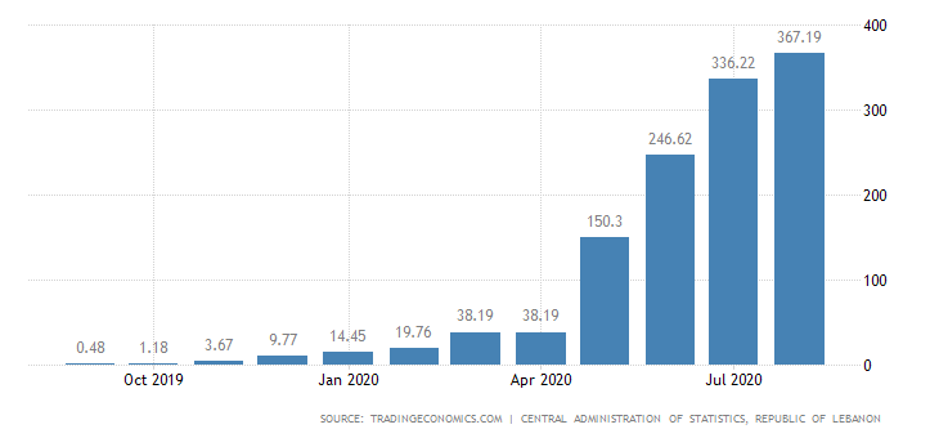
Creating a shift in this pillar requires the creation of more affordable food sources and extending the shelf life of perishable foods to minimize waste. For that to become a reality, agriculture and food sectors need to become smarter by involving technology. Innovation and technology are not only needed in transportation, business, or energy sectors, they are more than needed in the agri-food sector because we cannot sustain a living without being food secure. ‘We need to produce our food smartly to be affordable for economically unstable households, we need to optimize food transportation to reach food deserts and we highly need to reduce our food waste.’
 Entrepreneur Richardos Lebbos, Chairman and CEO of Starchy, began his journey because of a situation that sprang him to action. He could not forget the image of apple farmers in 2017 throwing their crops on the floor. They couldn’t afford cold storage, they didn’t have the means to export their produce, nor to compete with imported apples. There was a need for something to help them extend the storage life of their produce. “I began in the lab of USEK trying to create an edible barrier that can act as a block to elements, a controlled atmosphere for the fruit so I can decrease the oxidation and the respiration to extend the shelf life. This barrier is made with a 100% natural solution, a liquid that creates a transparent layer once sprayed on fruits, give a beautiful shine as well extending the life of apples for example to 50 days outside of the cold storage in an ambient temperature.
Entrepreneur Richardos Lebbos, Chairman and CEO of Starchy, began his journey because of a situation that sprang him to action. He could not forget the image of apple farmers in 2017 throwing their crops on the floor. They couldn’t afford cold storage, they didn’t have the means to export their produce, nor to compete with imported apples. There was a need for something to help them extend the storage life of their produce. “I began in the lab of USEK trying to create an edible barrier that can act as a block to elements, a controlled atmosphere for the fruit so I can decrease the oxidation and the respiration to extend the shelf life. This barrier is made with a 100% natural solution, a liquid that creates a transparent layer once sprayed on fruits, give a beautiful shine as well extending the life of apples for example to 50 days outside of the cold storage in an ambient temperature.
After creating the MVP, the first thing we did was to identify how to tackle the market and understand its real need. We needed to understand how to implement our innovation. Is it affordable? Is it something that you have to teach people how to use? Will you have to replace something that was used before and let the product do what it does? Our target was to replace both the natural and petro-chemical wax used to coat the apple with Startchy. We identified our main customers: the grower and the packer/shipper. We targeted a drop-in replacement, using our liquid with existing machines, and this is what helped us secure our seed fund rather than going for something that would take a decade to introduce to the market.”
 Maya el Hage, Livelihoods and Innovation Policy Officer in the World Food Program Lebanon gave a quick overview of the livelihood activities in the WFP Lebanon country office. WFP has an extensive livelihood program with a primary focus on resilience building by supporting vulnerable women and men in targeted refugee and Lebanese communities, sustainably improving their skills, capacities and opportunities. This support is delivered through two main modalities which are called food assistance for assets and food assistance for training. These are conditional cash assistance programs where the participants receive an amount of cash loaded on a debit card in exchange for their participation in activities which could be construed as a temporary income-generating opportunity, but it’s also cash assistance that is supposed to support their food security. Under the food assistance for assets program, unskilled participants work on reconstructing or rehabilitating a community asset, mostly agricultural in nature, for the benefit of the local agriculture production of that community. Under food assistance for training, the program provides individual capacity strengthening activities to individuals who are mostly youth, farmers, cooperatives, even agricultural associations. It provides them with the support needed to improve their income generation and enhance their livelihoods and basic life skills.
Maya el Hage, Livelihoods and Innovation Policy Officer in the World Food Program Lebanon gave a quick overview of the livelihood activities in the WFP Lebanon country office. WFP has an extensive livelihood program with a primary focus on resilience building by supporting vulnerable women and men in targeted refugee and Lebanese communities, sustainably improving their skills, capacities and opportunities. This support is delivered through two main modalities which are called food assistance for assets and food assistance for training. These are conditional cash assistance programs where the participants receive an amount of cash loaded on a debit card in exchange for their participation in activities which could be construed as a temporary income-generating opportunity, but it’s also cash assistance that is supposed to support their food security. Under the food assistance for assets program, unskilled participants work on reconstructing or rehabilitating a community asset, mostly agricultural in nature, for the benefit of the local agriculture production of that community. Under food assistance for training, the program provides individual capacity strengthening activities to individuals who are mostly youth, farmers, cooperatives, even agricultural associations. It provides them with the support needed to improve their income generation and enhance their livelihoods and basic life skills.
WFP works with cooperating partners who are usually local or international organizations. It also works with academia and the chamber of commerce to support small farmers and agriculture cooperatives. It provides participants with capacity-building training to enhance their soft skills, technical skills, business skills, development skills. Another form of support is in-kind, providing equipment and material against producing a comprehensive business plan. which clearly shows how this in-kind support would further enhance their profitability and their operations.
The third layer of support is in the form of providing market linkages and market accessibility support such as exhibitions, exposure, and mentorship.
According to Maya, one of the biggest bottlenecks to the development of the agriculture sector is in the antiquated methods of running businesses. The sector is predominantly lacking youth because it is not an attractive sector. The challenge exists in introducing new technology to old mindsets, in bringing forward new trends, that would influence business operations, therefore, enhance their productivity
 Elias Ghadban is the Regional Advisor for Food Security Issues at ESCWA. His role is to support the Ministries of Agriculture and Social Affairs to set up food security strategies that influence the four pillars of food security. HE works with the Ministry of Agriculture in Lebanon, Jordan, Sudan, and Iraq to improve the resilience of the agriculture system.
Elias Ghadban is the Regional Advisor for Food Security Issues at ESCWA. His role is to support the Ministries of Agriculture and Social Affairs to set up food security strategies that influence the four pillars of food security. HE works with the Ministry of Agriculture in Lebanon, Jordan, Sudan, and Iraq to improve the resilience of the agriculture system.
“To understand the access to food in the MENA region, we need to move from a baseline that the Arab region has around 18% of refugees who are vulnerable in terms of food access. We already have a weakness caused by the existing regional immigration crisis. Seven states are already identified under fragile and conflict-affected states. When we talk about a fragile state, it means we have instability or conflict that affects the livelihoods of the access of people to food in general. In addition to that, we need to differentiate between household and national level food security, in the latter, we need to take into consideration the poverty level, which in the Arab region is 16%, higher than the world average. We also need to take into consideration the food consumption in terms of total household expenditure, unemployment rates, inflation, and logistical issues, in addition to other sub parameters related to access to finance, agriculture, and import. These parameters define the accessibility of people to food: even if the food is available, who can access it?
Technology can help in food accessibility through systematic and informed decision-making. It can be used to improve productivity in sectors like agriculture to increase production, influencing the price, and increasing income when improving the efficiency of the system to utilize fewer resources to produce more. If we increase the presence of food in the market it will improve its accessibility because the price will be directly affected. ESCWA provides this knowledge with a country-level assessment of food security and we try to see how development programs are targeting the nationals or refugees are assisting in the three pillars of sustainability and the shortest one is the accessibility directly influenced by cash.
Investment of government in the agriculture sector in the region is minimal and to introduce new technologies the private sector and the non-profit role is predominant; the government would facilitate but they don’t have the human capacity nor the financial capacity to contribute to this across the Arab region and not only in Lebanon. The budget of the agriculture sector is in total less than 2.3% of the total expenditures.
Technology in the MENA region is largely needed to improve the efficiency and resilience of agriculture systems, value chain traceability, access to market, access to information, etc. We are still at the nascent stage in adopting technology and scaling it by the private sector and the facilitation of the government.”
Securing Sufficient Food Supply to MENA Growing Populations
Factors affecting food availability vary from resource ownership and management such as land, livestock and crops, to production processes and industrial food manufacturing, to environmental conditions and disasters, to supply chain conditions and distribution capabilities between countries and inside any given nation.
Major opportunities exist for technology-based businesses to make use of land, water, and energy to grow food more productively and economically in comparison with other usages such as urbanization and industrial projects. Other opportunities are materializing in the sectors of food-chain infrastructure and storage technologies.
In the last session of the series, Soha Nasser, Agri-food Expert at Berytech, went back to asking the same question she started the series with: “How do we feed 9 billion people by 2050?” If this question can highlight any fear related to food security, it is primarily the fear of not having enough food for the population expected in 30 years. For most of our History, whenever we have needed to produce more food, we have cut down forests or converted grasslands to make way for more farms. We can no longer afford, at a global level, to increase food production through agricultural expansion. By 2050 the world’s population will likely increase by more than 35%. To feed this population, crop production needs to double and food production in general needs to increase by 56% because production should outpace the population growth (National Geographic Magazine – The Future of Food)[6].
The MENA region that used to be considered as having an adequate food supply is now suffering. It is one of the biggest food importers in the world accounting for nearly one-third of the global serial imports. Because of the COVID-19 pandemic, the protection measures taken by governments are having a critical impact on the food supply chain and the availability of food for people. Due to the political instability in the region, Syria, Yamen, Sudan, in addition to Afghanistan are among the top ten countries that faced the worst food crisis in 2019 by the number of people affected, which mounted to 40 million. Looking at Lebanon, the Beirut port blast destroyed 15 metric tons of wheat as well as Lebanon’s main grain silos. The port destruction is affecting the food supply and food availability because the country heavily relies on imported food.
Another way of making food unavailable to people is having it wasted by other people. The MENA region wasted 19% of its available food and one-third of this loss occurs during consumption. The remaining two-thirds of this waste is lost all along the supply chain from production to distribution. To maintain the food security level needed for our country, we need to make the food and agriculture sectors as smart, as efficient and as productive as possible (WRI – World Research Institute)[7].
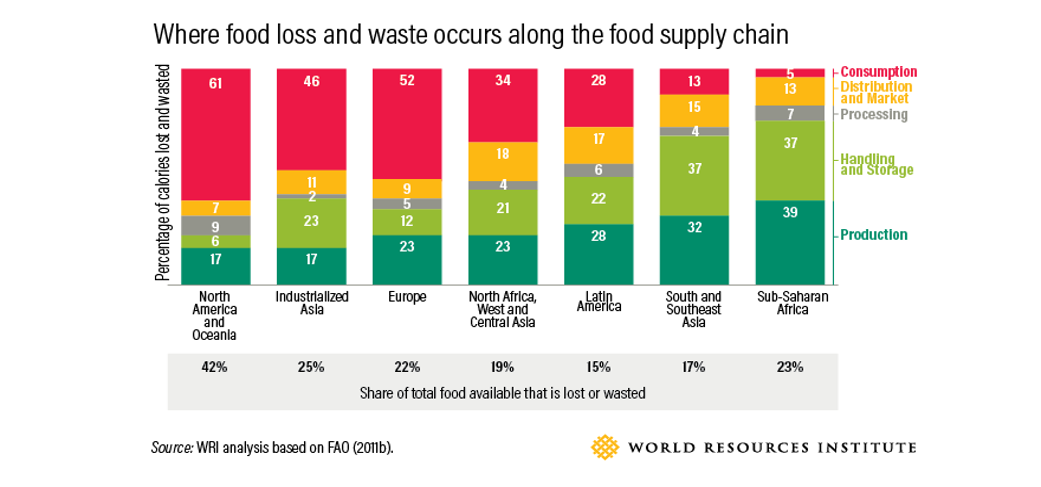
 Nayla Maalouf, Head of AgriGrow Nursery at Robinson Agri, looked back at the beginning of AgriGrow in 2000 where there was a worldwide trend towards professional nurseries. The growers were increasingly aware of the importance of using good quality seeding to ensure a better start for their crops and secure their harvest. Robinson Agri decided to start its first nursery in Jbeil using the same grafting technology used in Europe. AgriGrow started as a partnership between Robinson Agri and Plantise (formerly known as Grow Group) – a group of Dutch nurseries spread all over the world. The nursery adopted the European high-tech standards to the local conditions. “We believe that being a member of an international nursery network, AgriGrow will have the access to the needed support and the latest technologies and techniques in the nurseries field. Apart from growing grafted and non-graftable plants, AgriGrow also focused on developing the plantation of many of our local crops because we believe in preserving our endemic varieties.”
Nayla Maalouf, Head of AgriGrow Nursery at Robinson Agri, looked back at the beginning of AgriGrow in 2000 where there was a worldwide trend towards professional nurseries. The growers were increasingly aware of the importance of using good quality seeding to ensure a better start for their crops and secure their harvest. Robinson Agri decided to start its first nursery in Jbeil using the same grafting technology used in Europe. AgriGrow started as a partnership between Robinson Agri and Plantise (formerly known as Grow Group) – a group of Dutch nurseries spread all over the world. The nursery adopted the European high-tech standards to the local conditions. “We believe that being a member of an international nursery network, AgriGrow will have the access to the needed support and the latest technologies and techniques in the nurseries field. Apart from growing grafted and non-graftable plants, AgriGrow also focused on developing the plantation of many of our local crops because we believe in preserving our endemic varieties.”
Nayla continued explaining, “At AgriGrow, we believe that providing healthy plants to the growers plays a major role in securing their crops and in securing the food supply. At the nursery level, we are trying to select the suitable raw material from the choice of the potting soil to the choice of vegetable seeds. High standard seeds should be used, certified free from any disease. The seed itself can be the host of many diseases that can be transported from one country to another while being imported that could threaten production on a national level. Hybrid seeds, generated from crossing between varieties, can improve the quality and productivity of the crops. Implementing a strict hygiene protocol is imperative to make sure seeds and plants are clean from diseases. On another note, the water used at the nursery is continuously monitored and periodically tested to guarantee its cleanliness. Respecting the growing cycle of each crop will help us guarantee the delivery of good quality plants. Another important role we play is advising the grower on the most suitable plantation period and delivering the plants on time. This will optimize their harvest, secure production stability and the product’s quality, making it accessible to the end consumer.”
At the company level, Robinson Agri plays a major role in food security, by being continuously updated about new diseases that are occurring in the world. It also means having the access to the most recent varieties that provide higher yields and testing those under local conditions.
AgriGrow and Robinson Agri faced challenges in the economic crisis and during the pandemic. They shifted their focus to helping small, medium and big growers to secure the food value chain. Their concern was to provide all the material to keep the nurseries operating and to support the plant production process. “We believe in the cooperation between all the stakeholders to overcome the crisis – that is why we got in contact with many of the NGOs that are working in Lebanon active in the agriculture field to find the best possible solution to help the growers survive this tough year,” concluded Nayla.
 Simon Renk leads the monitoring and evaluation, and vulnerability analysis and mapping at the World Food Program in Lebanon, working to provide Lebanese households and Syrian refugees with food assistance.
Simon Renk leads the monitoring and evaluation, and vulnerability analysis and mapping at the World Food Program in Lebanon, working to provide Lebanese households and Syrian refugees with food assistance.
“We work a lot on the targeting. Who should we assist? Where are these people located? For which reasons and how many should we be assisting? We also work closely with the Government of Lebanon with the Ministry of Agriculture and the Ministry of Social Affairs. We also analyze and monitor the situation. We monitor prices for assistance, available food items in stores with which we also work. We also have information from the traders who explain to us how they see the situation.”
From the data that the WFP gathers, Simon confirms that food is available in the country despite the price fluctuation, but the issue is that Lebanon is an import-dependent country and with blocked money and capital control, the availability of food can change very quickly. Vigilance is needed as this stability can easily deteriorate.
“Although Lebanon is a small country, data is not as prominent or updated as we wish. Data is the core of taking objective decisions. Whoever is capable of enabling Lebanon and the entire region with updated data in a systematic manner and make it accessible can make a big difference and everyone can build on that, the private and public sector.”
For food availability in the markets, the WFP collects three data dimensions: price information, availability information, and the key link which is the exchange rate. They map it out to see how things evolve nationwide. WFP also gathers data on sources of income, sources of food and where people buy their food. The data is showing the WFP that people are turning towards commodities which are cheaper and subsidized. To some, it means moving to less nutritious foods, decreasing the quality of their diets and reducing their portion sizes.
“This is the data we collect, analyze, share, and take decisions based on. Use this data, which is available to work with, raise questions, and come up with solutions. Updated data, coherent collected information – anything that brings coherence and structure to the current situation allows us, the private sector the take better decisions. This is where you can make a difference.
Simon suggests a solution of crowdsourcing for price information that could be shared with people who are carefully managing their increasingly limited budgets
 Irene Boghdadi is the head of MSMEs and Entrepreneurship Support services at Chemonics Egypt and Consultant and Business Development Manager at Cleantech Arabia. Chemonics Egypt is a business and management consulting firm that operates in the region since 1992, a franchise of Chemonics International which is based in Washington DC. Over time, their clients have been companies, governments, the public sector, NGOs, and MSMEs. “We work in very sector-specific areas such as water supply, water treatment, wastewater, sustainable energy, and energy efficiency.
Irene Boghdadi is the head of MSMEs and Entrepreneurship Support services at Chemonics Egypt and Consultant and Business Development Manager at Cleantech Arabia. Chemonics Egypt is a business and management consulting firm that operates in the region since 1992, a franchise of Chemonics International which is based in Washington DC. Over time, their clients have been companies, governments, the public sector, NGOs, and MSMEs. “We work in very sector-specific areas such as water supply, water treatment, wastewater, sustainable energy, and energy efficiency.
Irene introduced the WE4F, which stands for Water and Energy for Food program – a worldwide initiative founded by the German Ministry for Cooperation and Development, as well as the Swedish International Development Cooperation, the Ministry of Foreign Affairs in the Netherlands, and the US Agency for International Development (USAID). The program aims to enable the production of more food with the efficient usage of water and energy along the full value chain from farming, all the way to the end-user.
Berytech is leading the consortium of 4 team members and Chemonics is one of the 4 entities along with CEWAS and IMWI. “We are going to be responsible for supporting 50 innovators from the MENA region for the next 3 years specifically in Algeria, Lebanon, Iraq, Morocco, Tunisia, Sudan, and Yemen. In these three years, the program anticipates the dispersing of 4.5 million dollars awarded in terms of technical assistance and cash grants.”
Series Episodes & White Paper
The Berytech Meetups powered by GIST are recorded sessions, which we make available to our community to benefit from the interventions. If you wish to watch the episodes for each session in the Series 1 – Food Security in the MENA, please click here.
If you wish to download the full document in PDF: Berytech White Paper – Food Security in MENA Region.
Join The Agri-Food Revolution
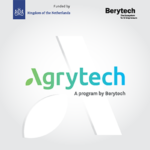 Berytech designed and developed its Agrytech program with the support of the Embassy of the Kingdom of the Netherlands to make sure Lebanon has the most competitive companies that are sourcing, solving, growing and transforming food, as well as feeding the world from Lebanon through creating jobs, advancing the ecosystem, developing the sector and contributing the UN’s sustainable developmental goals.
Berytech designed and developed its Agrytech program with the support of the Embassy of the Kingdom of the Netherlands to make sure Lebanon has the most competitive companies that are sourcing, solving, growing and transforming food, as well as feeding the world from Lebanon through creating jobs, advancing the ecosystem, developing the sector and contributing the UN’s sustainable developmental goals.
You can join the program by applying to one of its many activities, apply to the accelerator, provide your experience and expertise in the sector or join the QOOT, Lebanon Agrifood Innovation Cluster. If you have any questions about Berytech’s Agrytech Program, please email us on agrytech@berytech.org, and we will get back to you.
Berytech Meetups powered by GIST
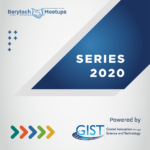
Presented by Berytech team member Zahi Hilal, Berytech Meetups is a program powered by the Global Innovation of Science and Technology network (GIST), initiated by the U.S. Department of State, aiming at building a strong and vibrant network of entrepreneurs in Lebanon focusing on science and technology. This year, Berytech is organizing Meetups with a series tackling five (5) major issues for Lebanon and the MENA region: Food Security in the MENA Region, Social Entrepreneurship in Lebanon, Renewable Energy, Solid Waste Management, and Raising a Generation of Coders. Learn more.
Sources
- [1] https://www.marketlinks.org/good-practice-center/value-chain-wiki/food-utilization-and-value-chain-approach
- [2] http://www.fao.org/news/story/en/item/1200484/icode/
- [4] https://foodblessed.org/about/#:~:text=In%20Lebanon%2C%20nearly%2030%20percent,money%20to%20make%20ends%20meet.
- [5] https://tradingeconomics.com/lebanon/food-inflation#:~:text=Food%20Inflation%20in%20Lebanon%20averaged,percent%20in%20October%20of%202009.
- [6] https://www.nationalgeographic.com/foodfeatures/feeding-9-billion/
- [7] https://pdf.wri.org/reducing_food_loss_and_waste.pdf







